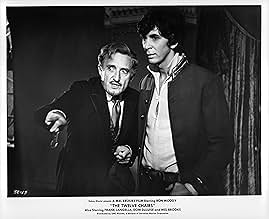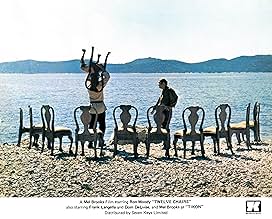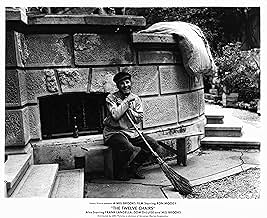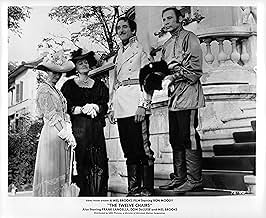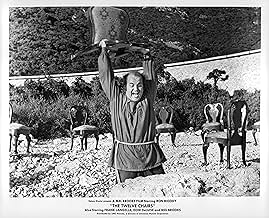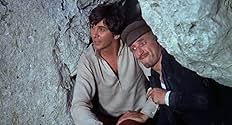IMDb रेटिंग
6.4/10
7.4 हज़ार
आपकी रेटिंग
1920 के दशक में सोवियत रूस, एक गिरा हुआ अभिजात वर्ग, एक पुजारी और एक चोर कलाकार बारह डाइनिंग कुर्सियों में से एक के अंदर छिपे गहने के खजाने की खोज करते हैं, जो क्रांति के दौरान खो गए थे.1920 के दशक में सोवियत रूस, एक गिरा हुआ अभिजात वर्ग, एक पुजारी और एक चोर कलाकार बारह डाइनिंग कुर्सियों में से एक के अंदर छिपे गहने के खजाने की खोज करते हैं, जो क्रांति के दौरान खो गए थे.1920 के दशक में सोवियत रूस, एक गिरा हुआ अभिजात वर्ग, एक पुजारी और एक चोर कलाकार बारह डाइनिंग कुर्सियों में से एक के अंदर छिपे गहने के खजाने की खोज करते हैं, जो क्रांति के दौरान खो गए थे.
- पुरस्कार
- 1 जीत और कुल 1 नामांकन
Andréas Voutsinas
- Nikolai Sestrin
- (as Andreas Voutsinas)
Mladen 'Mladja' Veselinovic
- Peasant
- (as Mladja Veselinovic)
Petar Banicevic
- Sergeant
- (बिना क्रेडिट के)
Dejan Cavic
- Orator
- (बिना क्रेडिट के)
फ़ीचर्ड समीक्षाएं
Knowing that Mel Brooks usually makes the silliest movies possible, it's a surprise that he directed the lightweight comedy "The Twelve Chairs". It portrays a former Czarist (Ron Moody, happy birthday!) and a young soldier (Frank Langella) looking for some jewels hidden in chairs in the Soviet Union in the 1920s. I will say that not much really happens throughout much of the movie, but it is a famous part of Russian literature. I haven't read the novel, but the movie is worth seeing, if only as a look at Brooks's early career. Also starring Dom DeLuise and Brooks in a small role.
Epilepsy...
Epilepsy...
I rented this film because it was the only Mel Brooks movie I hadn't seen. I had enjoyed all of his other movies and thought,"Why not see 'em all?" I thought since I hadn't heard of it it would be stupid. And, Man, was I wrong. This movie could be described as hilarious. I loved it. And it's not exactly like all other Mel Brooks movies. If you like Mel Brooks I recommend this film to you. Dom DeLuise is hilarious in this. Now go watch it with your family.
In his lifetime Mel Brooks has created many motion pictures which have established him as an artistic genius. "The Twelve Chairs" is another milestone for him. From the very beginning of this film, to its ending, there is a sense of serious, but humanistic brilliance. The era is the aftermath of the Russian Revolution and a dying woman wants to clear her conscience and reveal her greatest sin. As thousands of the nobility are fleeing for their lives, she decides to hide her family's fortune inside the lining of a set of handcrafted chairs. That secret is her dying revelation and is said unfortunately into more than one set of ears. This initiates a mad dash for the lost treasure. Seeking the cache of jewels are three intrepid, but greedy set of characters. The first is incredibly talented Ron Moody who adroitly and brilliantly plays the legitimate, greedy and opportunistic son, Ippolit Vorobyaninov. Once a Marshall of the nobility, he is now reduced to a minor banking clerk and opportunistic son-in-law. Frank Langella is superior as Ostap Bender, a handsome, street-wise, traveling Gypsy, who also wants in on the treasure hunt. Finally there is Dom DeLuise who plays Father Fyodor, an Orthodox but impoverished monk who believes, God will help him find the elusive chair first. What the trio soon discover is that the chair is one of Twelve which have been scattered across the vast twelve thousand miles of Russia. If Mel Brooks sought to create an amusing memorable movie, he succeeded. By the time one reaches the end of this film, we realize . . . . a Classic has been born. ****
As Mel Brooks films go, I rate it second only to Young Frankenstein. The action takes place in Russia 10 years after the Revolution. Ron Moody is marvelous as a low IQ and totally inept former nobleman, now hiding out as a clerk in a government office, who learns that the family jewels had been sewn into one of the 12 dining room chairs. He returns to his former residence, now an old folks home, and learns from former servant, now janitor, Mel Brooks that the chairs are gone, confiscated by the government. Con man Frank Langella threatens to turn Moody in if he does not allow him in on the quest. Of course, the chairs have been widely distributed. A major fly in the ointment is Dom Deluise, the village priest, who has also learned the secret. He relinquishes all for greed ("O, Thou who knowest all---you know.") and competes in the search. Not a perfect movie, but loaded with laughs. May be Dom's funniest role. I give it an 8 out of 10.
A long time ago, Mel Brooks had a subtle side.
Hard to believe, isn't it? The man responsible for such guffaw-fests as "Blazing Saddles", "Silent Movie", "High Anxiety" and such.... SUBTLE?
In "The Twelve Chairs", he does get laughs out of the story of a Russian nobleman searching for jewels sewn into one of twelve of his family's chairs that have been sold with the rest of his family's possessions. But not the way we're use to seeing Mel earn them.
This, time, he gets them through character study, human nature, individuals' reactions to certain embarrassing situations and, of course, good old-fashioned greed. And the laughs are there, to be sure.
I'm actually surprised that I liked this as much as I did. I'm used to Mel up there with the lampshade on his head, yucking it up with wild abandon. This film, subtle as it is, makes me laugh.
Of course, for purists, there's always good old DeLuise as another conniver searching for the same jewels. He makes with the wildness and insanity that makes a Mel Brooks film a Mel Brooks film, and he's a joy to see.
The others, Moody and Langella in particular, play regular human beings who see a situation, assess it and act as (nearly) anyone else would. More humorously, of course.
Seek out "The Twelve Chairs". Rare as it is, a rose by any other name....
And you know the rest.
Eight stars. Hey! Hey, hey, hey!
Hard to believe, isn't it? The man responsible for such guffaw-fests as "Blazing Saddles", "Silent Movie", "High Anxiety" and such.... SUBTLE?
In "The Twelve Chairs", he does get laughs out of the story of a Russian nobleman searching for jewels sewn into one of twelve of his family's chairs that have been sold with the rest of his family's possessions. But not the way we're use to seeing Mel earn them.
This, time, he gets them through character study, human nature, individuals' reactions to certain embarrassing situations and, of course, good old-fashioned greed. And the laughs are there, to be sure.
I'm actually surprised that I liked this as much as I did. I'm used to Mel up there with the lampshade on his head, yucking it up with wild abandon. This film, subtle as it is, makes me laugh.
Of course, for purists, there's always good old DeLuise as another conniver searching for the same jewels. He makes with the wildness and insanity that makes a Mel Brooks film a Mel Brooks film, and he's a joy to see.
The others, Moody and Langella in particular, play regular human beings who see a situation, assess it and act as (nearly) anyone else would. More humorously, of course.
Seek out "The Twelve Chairs". Rare as it is, a rose by any other name....
And you know the rest.
Eight stars. Hey! Hey, hey, hey!
क्या आपको पता है
- ट्रिवियाMel Brooks had problems with Yugoslavian extras who didn't speak English. In one scene, extras playing museum guards were supposed to walk through a museum, ringing hand bells and shouting, "Closing time! Closing time!" Instead, the extras misunderstood and shouted, "Cloakie Bye! Cloakie Bye!" Brooks decided "Cloakie Bye" was funnier, so he left it in the movie.
- गूफ़During the chase through the train yard, a modern era bus can be seen passing in the background.
- भाव
Ostap Bender: [after yet another failure] Remember the famous Russian proverb: "The hungrier you get, the tastier the meal." On the other hand, the French have a proverb: merde!
- क्रेज़ी क्रेडिटIn the opening credits the title of the movie is showed in Russian first (even with a typographic error 'Dvenadzat' stchlyev'), then it changes into the english title. The same happened at the end of the credits with the words "The end" (Konez), first cames the Russian word, than the english translation.
- कनेक्शनFeatured in Sneak Previews: Take 2: Who's Funnier: Mel Brooks or Woody Allen? (1980)
- साउंडट्रैकHope for the Best, Expect the Worst
Music by Johannes Brahms ("Hungarian Dance No. 4 in F# minor") and lyrics by Mel Brooks
टॉप पसंद
रेटिंग देने के लिए साइन-इन करें और वैयक्तिकृत सुझावों के लिए वॉचलिस्ट करें
- How long is The Twelve Chairs?Alexa द्वारा संचालित
विवरण
बॉक्स ऑफ़िस
- US और कनाडा में सकल
- $18,06,258
इस पेज में योगदान दें
किसी बदलाव का सुझाव दें या अनुपलब्ध कॉन्टेंट जोड़ें



